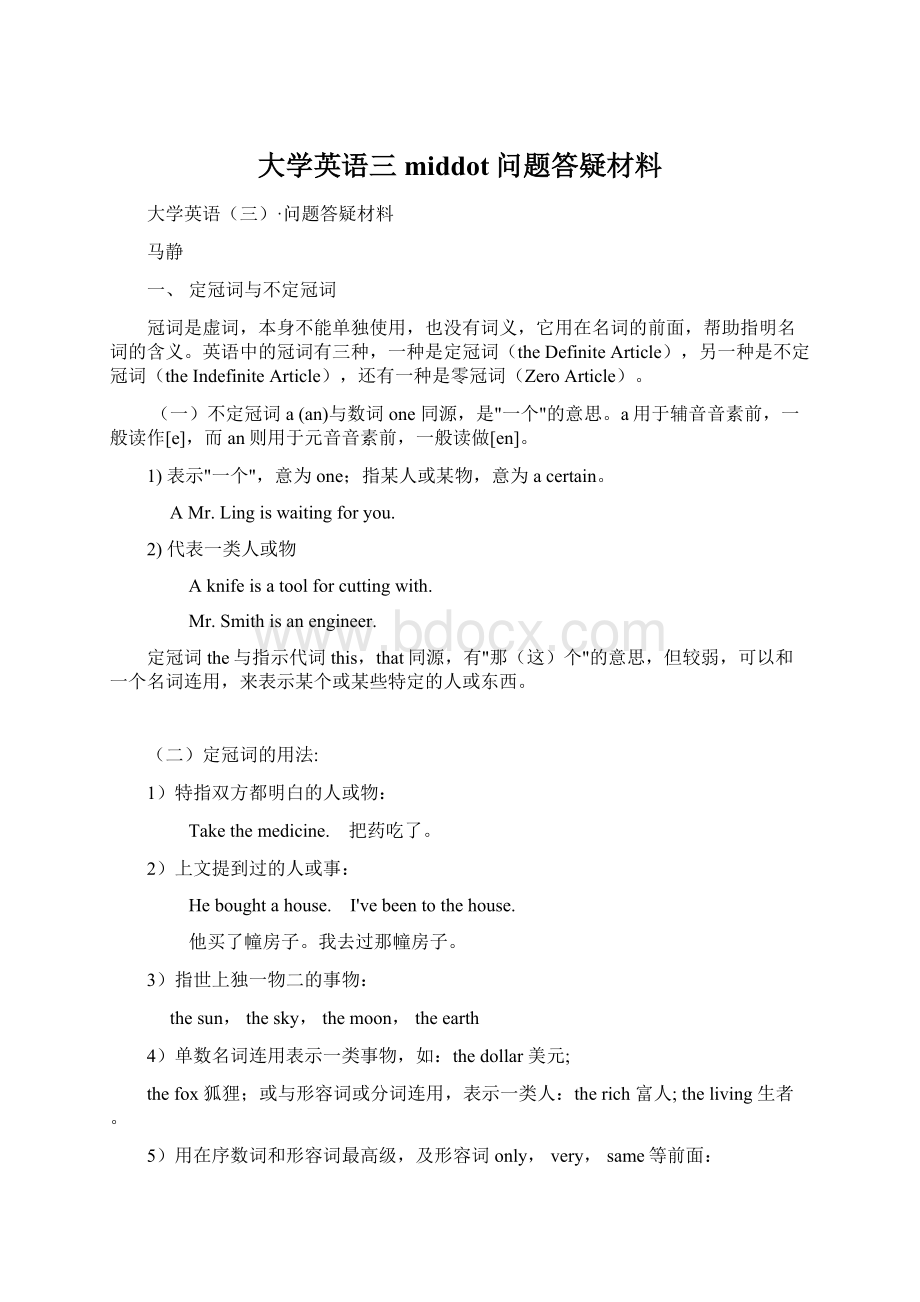大学英语三middot问题答疑材料.docx
《大学英语三middot问题答疑材料.docx》由会员分享,可在线阅读,更多相关《大学英语三middot问题答疑材料.docx(18页珍藏版)》请在冰豆网上搜索。

大学英语三middot问题答疑材料
大学英语(三)·问题答疑材料
马静
一、定冠词与不定冠词
冠词是虚词,本身不能单独使用,也没有词义,它用在名词的前面,帮助指明名词的含义。
英语中的冠词有三种,一种是定冠词(theDefiniteArticle),另一种是不定冠词(theIndefiniteArticle),还有一种是零冠词(ZeroArticle)。
(一)不定冠词a(an)与数词one同源,是"一个"的意思。
a用于辅音音素前,一般读作[e],而an则用于元音音素前,一般读做[en]。
1)表示"一个",意为one;指某人或某物,意为acertain。
AMr.Lingiswaitingforyou.
2)代表一类人或物
Aknifeisatoolforcuttingwith.
Mr.Smithisanengineer.
定冠词the与指示代词this,that同源,有"那(这)个"的意思,但较弱,可以和一个名词连用,来表示某个或某些特定的人或东西。
(二)定冠词的用法:
1)特指双方都明白的人或物:
Takethemedicine. 把药吃了。
2)上文提到过的人或事:
Heboughtahouse. I'vebeentothehouse.
他买了幢房子。
我去过那幢房子。
3)指世上独一物二的事物:
thesun,thesky,themoon,theearth
4)单数名词连用表示一类事物,如:
thedollar美元;
thefox狐狸;或与形容词或分词连用,表示一类人:
therich富人;theliving生者。
5)用在序数词和形容词最高级,及形容词only,very,same等前面:
Wheredoyoulive?
Iliveonthesecondfloor. 你住在哪?
我住在二层。
That'stheverythingI'vebeenlookingfor. 那正是我要找的东西。
6)与复数名词连用,指整个群体:
Theyaretheteachersofthisschool.指全体教师)
Theyareteachersofthisschool. (指部分教师)
7)表示所有,相当于物主代词,用在表示身体部位的名词前:
Shecaughtmebythearm.. 她抓住了我的手臂。
8)用在某些由普通名词构成的国家名称、机关团体、阶级、等专有名词前:
thePeople'sRepublicofChina 中华人民共和国
theUnitedStates 美国
9)用在表示乐器的名词之前:
Sheplaysthepiano. 她会弹钢琴。
10)用在姓氏的复数名词之前,表示一家人:
theGreens 格林一家人(或格林夫妇)
11)用在惯用语中:
intheday,inthemorning(afternoon,evening), thedayaftertomorrow thedaybeforeyesterday, thenextmorning等等。
二、虚拟语气的用法:
(一):
最基本的虚拟语气句型:
1.虚拟现在时表示与现在事实相反的假设,其if从句的谓语形式用动词的过去式(be一般用were),主句用would/should/could/might+动词原形。
Ifplaceswerealike,therewouldbelittleneedforgeographers.如果各个地方都一样,就不需要地理学家了。
2.虚拟过去时是表示与过去事实相反的假设,if从句的谓语形式用过去完成时即had+过去分词,主句用would/should/could/might+have+过去分词。
Ifhehadknownyouraddressyesterday,hewouldhavetelephonedyou.
3.虚拟将来时是表示对将来实现的可能性很小的或不确定的假设。
If从句的谓语形式用一般过去式或用wereto/should+动词原形,主句用would/should/could/might+动词原形。
Ifheweretoleavetoday,hewouldgettherebyFriday
4.省略if采用倒装语序的条件句。
有时可以把含有助动词、情态动词、be或have的虚拟条件句中的连词if省去,而将had,should,were等词提到主语之前,即用倒装结构。
Ifhehadworkedharder,hewouldhavegotthroughtheexams.==>Hadheworkedharder,hewouldhavegotthroughtheexams.Ifheweretoleavetoday,hewouldgettherebyFriday.==>Werehetoleavetoday,hewouldgettherebyFriday.IfIwereinyourplace,Iwouldn’tdothat.==>WereIinyourplace,Iwouldn’tdothat.
5.有时虚拟条件句并没用if从句表示出来,而是用介词短语(otherwise,or,without,butfor)、上下文或其它方式来表示。
如:
Wedidn'tknowhistelephonenumber;otherwisewewouldhavetelephonedhim.Withoutyouhelp,Iwouldn’thaveachievedsomuch.Butfor(“要不是......”的意思)yourhelp,Iwouldnothavesucceeded.
(二):
虚拟语气在从句中用should的情况:
1.在表示建议,要求,命令,想法的动词后的从句里,用should+动词原形,should可以省略.如advise,agree,command,decide,demand,determine,grant,indicate,insist,order,prefer,propose,request,require,stipulate,suggest,urge,vote.常考到的是:
suggest,advise,demand,require,propose,insist,order,request.
Hisdoctorsuggestedthathe(should)takeshortleaveofabsence.
TheauthorproposedthatTV(should)beturnedoffatleastonehoureveryday.
2.在表示建议,要求,命令,想法的名词后的从句里,用should+动词原形,should可以省略.如advice,decision,agreement,command,decree,demand,determination,indication,insistence,order,preference,proposal,request,requirement,stipulationetc.
ItwasBill’ssuggestionthateveryone(should)haveamap.
Hissuggestionwasthateveryone(should)haveamap.
Hegaveusasuggestionthateveryone(should)haveamap.
3.在Itis/was+形容词后的that从句中用should的结构,should可以省略.这类形容词常见的有:
advisable,anxious,compulsory,crucial,desirable,eager,essential,fitting,imperative(绝对必要),impossible,improper,important,natural,necessary,obligatory,possible,preferable,probable,recommended,urgent,vitaletc.
It‘snaturalthatshe(should)doso.
Itisessentialthatwe(should)tellherthenews.
4.在lest和forfearthat(以免),incase(以防)从句中用should,should可以省略.
Shewalkedquietlylestshe(should)wakeupherroommates.
Haveyourgunreadyincaseweshouldneedit.
(三):
wish后的that从句中:
1.表示现在或将来的愿望,从句中过去式.
IwishIknewhisaddress.
IwishIwereyoung.
2.表示过去没有实现或不可能实现的愿望,从句用过去完成式或would,could,might+have+过去分词.
Iwishyouhadwrittentohim.
IwishIcouldhavesleptlongerthismorning,butIhadtogetupandcometoclass.
3.如果将wish改成wished,其后that从句中动词的形式不变.
4.如果that从句中用would,一般表示对现状不满或希望未来有所改变或请求
Iwishhewouldanswermyletter.
Iwishpriceswouldcomedown.
Iwishyouwouldhelpme.
Iwishyouwouldstopaskingsillyquestions.
(四):
在It’sabout/high/first(second,thirdetc)time后的that从句中,用过去式.表示“该是做什么的时候了”
Itisabouttimeyouwereinbed.
Itishightimeweleft.
ItisthefirsttimeIcamehere.
(五):
在wouldrather,wouldsooner,wouldjustassoon后的that从句中,用过去式或过去完成式,表示“宁愿做什么”
Iwouldratherhecametomorrowthantoday.
Johnwouldratherthatshehadnotgonetothepartyyesterdayevening.
(六):
在ifonly(“如果....就好了”的意思)感叹句中,谓语动词与wish宾语从句的虚拟形式相同.
Ifonlyhedidn’tdrivesofast!
(现在)
Ifonlyshehadaskedsomeone’sadvice.(过去)
Ifonlytherainwouldstop.(将来)
(七):
在asif/asthough从句中,表示和现在事实相反或对现在情况有所怀疑,用过去式;表示过去想象中的动作或情况,用过去完成式
Hespeaksasifhewereonthespot.
ShespoketomeasifIweredeaf.
Thisdeviceoperatedasthoughithadbeenrepaired.
注:
1.在asif/asthough句中,如果有可能成为事实,用陈述语气.
Helooksasifheisgoingtobeill.
2.在insist后的从句中,如果是坚持自己,用陈述语气,坚持别人做什么事情,用虚拟语气.
Sheinsiststhatsheisright.
SheinsistedthatIshouldfinishtheworkatonce.
三、非谓语动词与谓语动词
非谓语动词主要包括不定式&动名词&分词(现在分词和过去分词),.即动词的非谓语形式除了不能独立作谓语外,可以承担句子的任何成分
它有三种形式:
不定式,分词(现在分词、过去分词),动名词
1.非谓语动词与谓语动词的相同点有:
(1)如果是及物动词都可与宾语连用,例如:
Theybuiltagarden.
Theysuggestedbuildingagarden.
(2)都可以被状语修饰:
Thesuitfitshimverywell.
Thesuitusedtofithimverywell.
(3)都有主动与被动,“体”式(一般式;进行式;完成式)的变化。
例如:
Hewaspunishedbyhisparents.(谓语动词被动语态)
Heavoidedbeingpunishedbyhisparents.(动名词的被动式)
Wehavewrittenthecomposition.(谓语动词的完成时)
Havingwrittenthecomposition,wehandeditin.(现在分词的完成式)
(4)都可以有逻辑主语
Theystartedtheworkatonce.(谓语动词的逻辑主语)
Thebossorderedthemtostartthework.(动词不定式的逻辑主语)
WeareLeaguemembers.(谓语动词的主语)
WebeingLeaguemember,theworkwaswelldone.(现在分词的逻辑主语)
2、非谓语动词与谓语动词的不同点有:
(1)非谓语动词可以有名词作用(如动词不定式和动名词),在句中做主语、宾语、表语。
(2)非谓语动词可以有形容词作用(如动词不定式和分词),在句中做定语、表语或宾语补足语。
(3)非谓语动词可以有副词作用(如动词不定式和分词),在句中作状语。
(4)谓语动词在句中作谓语,受主语的人称和数的限制。
四、比较级和最高级的构成和用法
①单音节形容词以及少数以er,ow结尾的形容词和副词加“er”,“est”。
例如:
great,greater,greatest;fast,faster,fastest;clever,cleverer,cleverest;narrow,narrower,narrowest
②以e结尾的单音节形容词和副词,以及少数以ble,ple结尾的双音节形容词和副词后,加“r”,“st”。
例如:
large,larger,largest;able,abler,ablest;simple,simpler,simplest
③以一个辅音字母结尾的单音节形容词,其前的元音字母发短元音时,该辅音字母要双写,然后加“er”,“est”。
例如:
hot,hotter,hottest;big,bigger,biggest
④以辅音字母加y结尾的形容词和少数不是形容词加ly构成的副词,要将y改为i,再加“er”,“est”。
例如:
easy,easier,easiest;early,earlier,earliest
⑤一般双音节词、多音节形容词和副词在原级前加more或most。
例如:
beautiful,morebeautiful,mostbeautiful;carefully,morecarefully,mostcarefully
⑥少数单音节形容词如real,glad,fond,tired,pleased等也加more和most构成比较级和最高级。
例如:
tired,moretired;mosttired,pleased,morepleased,mostpleased。
形容词与副词的比较等级
1.原级比较(肯定形式as…as…和否定形式not as / so…as…)
Chinese is not so difficult as Latin.
注:
在形容词原级比较结构的句子中,可以加上数量词作状语,表示倍数或分数关系。
We’ve produced twice / three times as much cotton this year as we did last year.
This lake is half / one-third as big as that one.
2. 比较级(…than…或more…than…)
(a) 构成方法:
单音节词和少数双音节词(主要是以y结尾的词)前加-er,多数双音节词和全部多音节词前加more。
当然,还有些不规则变化的词,如far, old, little, late, good / well, bad / badly / ill, many / much等。
(b)用法(其基本结构为…than / more…than…)
(1)当同一个动词用于than前后时,一般用一个助动词代替第二个动词。
Now we speak more English than we did last term.
(2)比较级前可加表示程度的状语(如much, many, far, a lot, a great deal, a little, a bit等),也可加数量词表示倍数、分数和百分数。
They have much more knowledge / many more books than me.
Cotton output was 2 percent higher than in the previous year.
The price of our product is one fourth cheaper than the market price.
(3)使用比较级时要注意避免比较级的重叠、比较级对象的重叠、不合逻辑的比较和搭配错误。
* It is less colder today than yesterday.(应改为less cold或colder)
* Mary is more beautiful than any girl in the class.(应改为any other girl)
* The climate of Japan is milder than Canada.(应改为that of Canada)
* This book is the same like that one.(应改为as)
(4) 句型“the+比较级,the+比较级”表示“越…越…”之意。
The harder you work, the more you will learn.
(5) 注意区别more…than…(比…更…,与其说…不如说…)/more than(超过,多于), no more…than…(和…一样不…)/no more than(仅仅), not…more than…(不如)/not more than(不超过).
五、动词时态
1.一般情况下,动词时态可根据句中表示时间的状语而定。
(具体情况见教材)
2.固定句型中的时态情况:
(1) 时间或条件状语从句中用一般现在时代替一般将来时。
Please give the book to Jack when/if he comes here tomorrow.
注:
有时will可用于条件状语从句中,但不是表示将来,而是表示意愿。
We’ll ask someone else if you won’t come. (注意翻译)
(2)虚拟条件状语从句中的时态问题详见下面的“虚拟语气”部分。
(3) since引导的时间状语从句中,主句用现在完成时,从句用一般过去时。
Great changes have taken place in my hometown since I left.
注:
如果主句是表示一段时间的话,既可用现在完成时, 也可用一般现在时。
It is /has been 10 years since I left my hometown.
(4)动作动词 come, go, leave等可用现在进行时代替一般将来时。
I’m leaving for Shanghai tomorrow. (当然也可用will leave)
(5)since liberation, for two days, so far, until now, up to now, in recent years, in/for/over/during the past/ last/recent ten years等作状语,谓语动词用现在完成时。
We have seen each other three times in the past two months.
(6)在句型“It /this is the first/second time (that)…” 中常用现在完成时;在句型“It/that was the first/second time (that)…” 中常用过去完成时。
It is the third time (that) I have visited Japan.
That was the first time (that) he had spoken to me.
(7由by构成的时间状语常跟完成时相呼应。
若表示将来,则用将来完成时; 若表示过去,则用过去完成时。
We’ll have learned 3,000 English words by the end of this term.
By the end of last year, he had worked for ten years.
注:
由up to构成的时间状语跟by的用法相似,若表示现在,则用现在完成时,如up to now;若表示过去,则用过去完成时,如up to then。
(8)在句型“hard